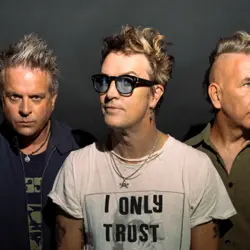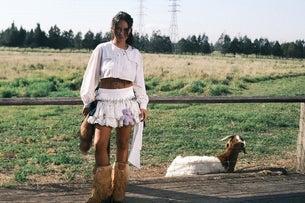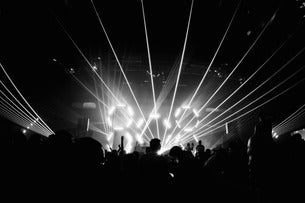 The Living End
The Living EndIt couldn't have been more straight forward. The original idea was to play their debut album in its entirety at a gig or two. But the more the band and management talked, the bigger the concept became. All six albums, all cities and let's take a swag of support bands along for the ride. The Living End's The Retrospective Tour has become one of the most successful Australian tours by a local band, ever. As gig after gig sold out, the band were hunkered down at Melbourne's Deluxe Studios bringing to life the 80 or so songs from their back catalogue. Again, it would have been much simpler to take one set of standard TLE gear out to nail these songs, but that's not The Living End's way. “We want to try to play the albums as true as possible,” said bass player Scott Owen. Guitarist and TLE main man Chris Cheney agrees. “When there are 80 songs to learn, we don't want there to be 80 songs with the same guitar tone for every single tune.” Such fastidiousness comes at a price though. Not only did they have to go back and learn the back catalogue, they also had to try to recall what gear was used on each track. “We've been like, 'I can't remember what delay that was, put the record on!' So we'd tweak it and try to match it.”
Chris has dusted down some old guitars for the tour and is keen to give them some stage time to help emulate the original album tones. “I have an old 1962 Double Anniversary Gretsch which is just beautiful. It's kind of like an old car, when it's up and running. It's nice but it takes a little bit to get going and doesn't really compete that well with my newer Gretschs. I'm dialing in a few little sounds here and there on my effects board but otherwise it is still pretty bare bones. It's still a basic rock n roll foundation and not many effects… a lot of delays! Scott is also excited to be hearing Chris rip out some classic Living End riffs. “It's awesome to hear all of that stuff again,” he said. “Chris is being fucking shy, he's rather meticulous about his effects and getting them all perfect like they are on the record.”
Their gear has actually changed over the years, as they discovered during rehearsals. “I was looking at a photo of Scott and I and our first drummer playing at the Yarraville Hotel back in about 1993,” recalls Chris. “I had two Fender Twins behind me, a Tube Screamer and a digital delay pedal, which I used to adjust the increments on as I went. Now I have this pedalboard in front of me which basically has a whole lot of buttons on it which are like patches, which then go back through like a brain, which then engages certain pedals and delays and it is very convoluted. Basically, now I am running like a C3PO-like Millenium Falcon pedalboard! We started out with a direct line in, maybe a delay pedal, Chuck Berry style and it's kind of gone more U2 as we have gone along. I'm [pretty] strict in getting the delays right. Some of the songs depend on that. My biggest thing is that I can't remember half the shit that I was playing with on those earlier records. We've got an extra guitar player now, Adrian Lombardi, so I not only have to learn what I used to play, but I have to learn the overdubs too. He'll be like, 'How are you playing that bit?' and I'm like, 'Dude, I don't know… I'm just trying to figure out my own bit.' Adrian has been our touring rhythm guitar player now for almost two years.”
It's not just Chris and his original guitar tones which needed to be recreated. The same issues befell bassist Scott and to a lesser degree drummer Andy Strachan. Often it took a flick through photo albums to find clues as to what gear they were using at any given time. “Those old photos that I found, you had three milk crates and you had that cube on top, another little speaker on top of that then a tweeter thing,” Cheney recalls of Scott's bass rig. “It looked like a little robot. That was like '93, '94, we were just out of school and you went through a lot of pickups.”
Don't miss a beat with our FREE daily newsletter
Like most musicians, Scott has always been on the quest for a perfect stage sound but for someone who plays a double bass, it's never been easy. “It always been a major thorn in my side, playing an instrument in a manner it wasn't supposed to be played,” said Scott. “Then getting it to be amplified and sound like a quality instrument on a rock'n'roll stage, is a real mission. I'm always getting closer and closer to what I'm seeing in my mind. It's hard. It's not like going into a guitar shop and saying, 'I'll have that sound'. It's something that I have to make up. I went through all these weird and wacky ideas of getting the pickup inside the bass, mounting pickups inside them in which case you need to cut a hole in the bass to get in there. There's been one luthier who has tended to my every whim with [the] double bass over all the years I have played, Ben Puglisi, and I appreciate him so much. Even when I have ideas like, 'Why not cut a hole in this section? He's gone, 'Man, you are going to regret that so much one day… I'll do it for you just to appease your curiosity but you're going to fucking regret it, I swear to God.' A year later I'd bring it in and ask him to patch that hole up but yes, it's been an endless search.”
For Cheney, the quest for the perfect sound is part and parcel of what being in a rock band is all about. “You've got to search for those things because there wasn't a template for what we were trying to do at that early point,” he said. “There's parts of us that wanted to be this but also a modern rock band, not a traditional rockabilly band – we want to be able to play at volume. I've got extra struts in my guitars from trying to play at high volume… extra things that I have put into my guitars over the years to try to handle the fact that we're this rockabilly band that wants to be The Who!”
Looking back, Andy Strachan believes he has gone smaller and quieter with his drum kit. “My drum tech and front of house guys over the years have said to me, 'You don't need cymbals that make your eyes bleed', but that's what I thought back then,” he said. “On the Big Day Out stage or whatever, I thought you needed cymbals that were louder then amps. You don't. That's what microphones are for, so that's the only lesson I have really learnt. Other than that, I try to get new drums to sound like vintage drums. They're all thin shells, mahogany and maple. It's a Pearl Masterworks kit. Masterworks is apparently like … whatever you want. Their idea is that they'll build you whatever you need. To that degree, they're right on the money and will pretty much do whatever you want. Instead of having 8 ply maple and 3 ply birch, I go for 4 plys of mahogany with maple blue rings and that's as close as I have found to a vintage drum kit. I try to make them sound as old as possible. The cymbals are a big thing I learnt. They're thin and quieter cymbals and actually sound a lot better, especially when you have the vocal mic open, like a Z Custom is just going to bleed all over the stage and ruin the front of house guy's day. That's where it all stemmed from, the front of house guy and drum tech saying that it doesn't have to be that loud. The snare drum either; you can play quietly and let the mics do the work. With the cymbals, Zildjian K Hybrid Crashes is what I have been playing, quite thin but 18s and 19s, 21” sweet ride which is what I have been playing for five or six years now; and a pair of 15” Hybrid hats, K Lights so they are quite thin – way quieter than they used to be. I used to play all Z Customs and A Projections, cymbals which tore your ears apart.”
As the beers chugged down and the memories become more vivid, the guys revelled in stories about how the band has given them the opportunity to meet some of their musical heroes, and how bizarre it has been that some of them such as Richard Clapton, Brad Shepherd, Daryl Braithwaite, and Neil Finn bother to come backstage or even compliment them on their music. After all these years and a new record breaking tour, it seems The Living End deep down are basically just music fans. “It's why we're here,” said Chris. “It's gotta be why we're here: a) because we are patient, b) because we are ambitious motherfuckers and c) because we are music lovers. We still get along. We have been through everything a band could possibly go through. We've been through drug issues, girlfriend issues, issues where I don't want to see you or be around you, musical direction issues. We've been through everything like that and we are still around. A lot of bands don't have that patience. We've always felt that we can go on and do something a little better.” Andy's eyes light up too and chips in. “There was a moment a couple of weeks ago and we were playing How Do We Know and it felt fantastic. The whole rehearsal went for about five hours playing together and going, 'Yeah, that was fine'. Then there was this magic moment where, even after all this time… we have played that song a thousand times but it just felt so exciting and so good. That's what it is all about… those moments.” “It's not about the accolades or how many payers or much merch we sold,” Chris says in summary. “It's really about, 'Shit that felt good when we played'. You hope that never leaves you.”


















